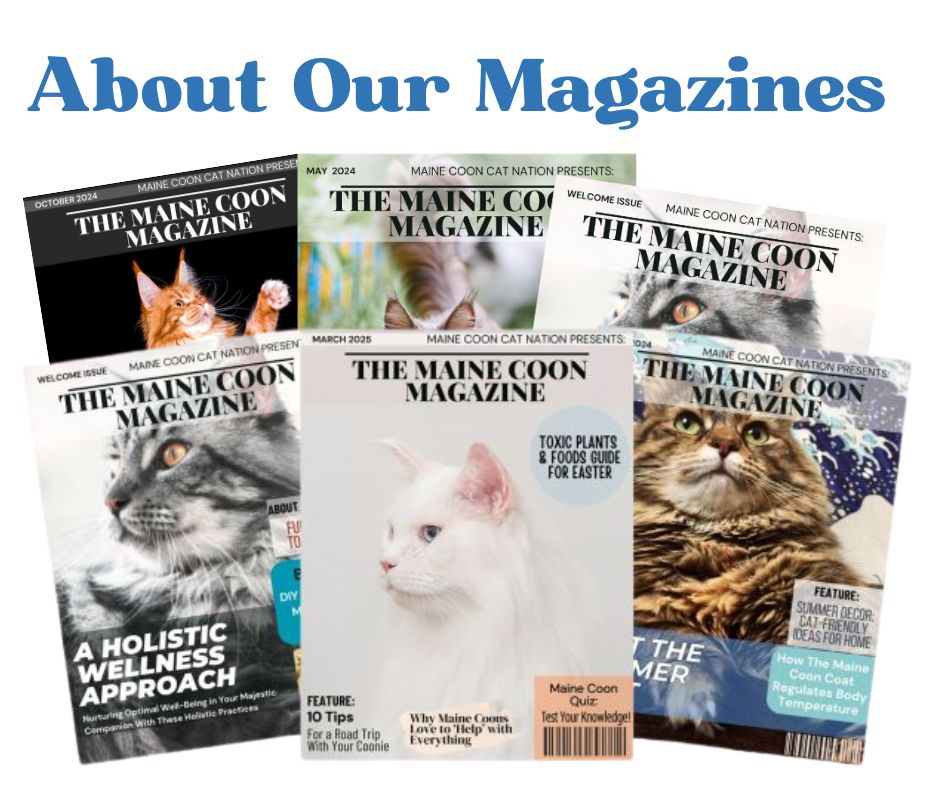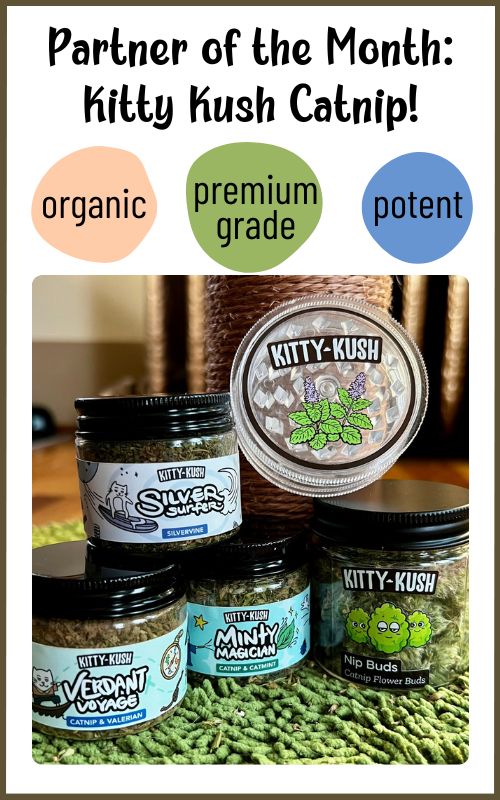- Home
- Maine Coon Cat Health
- Weight, Growth and Size
Disclosure: this site is reader-supported. When you buy through links on our site, we may earn a small commission, at no extra cost to you.
Maine Coon Weight
Questions About Kitten Growth and Cat Size
All about Maine Coon weight: Kitten growth and size, recognizing overweight or underweight cats. How much should a Maine Coon cat weigh?
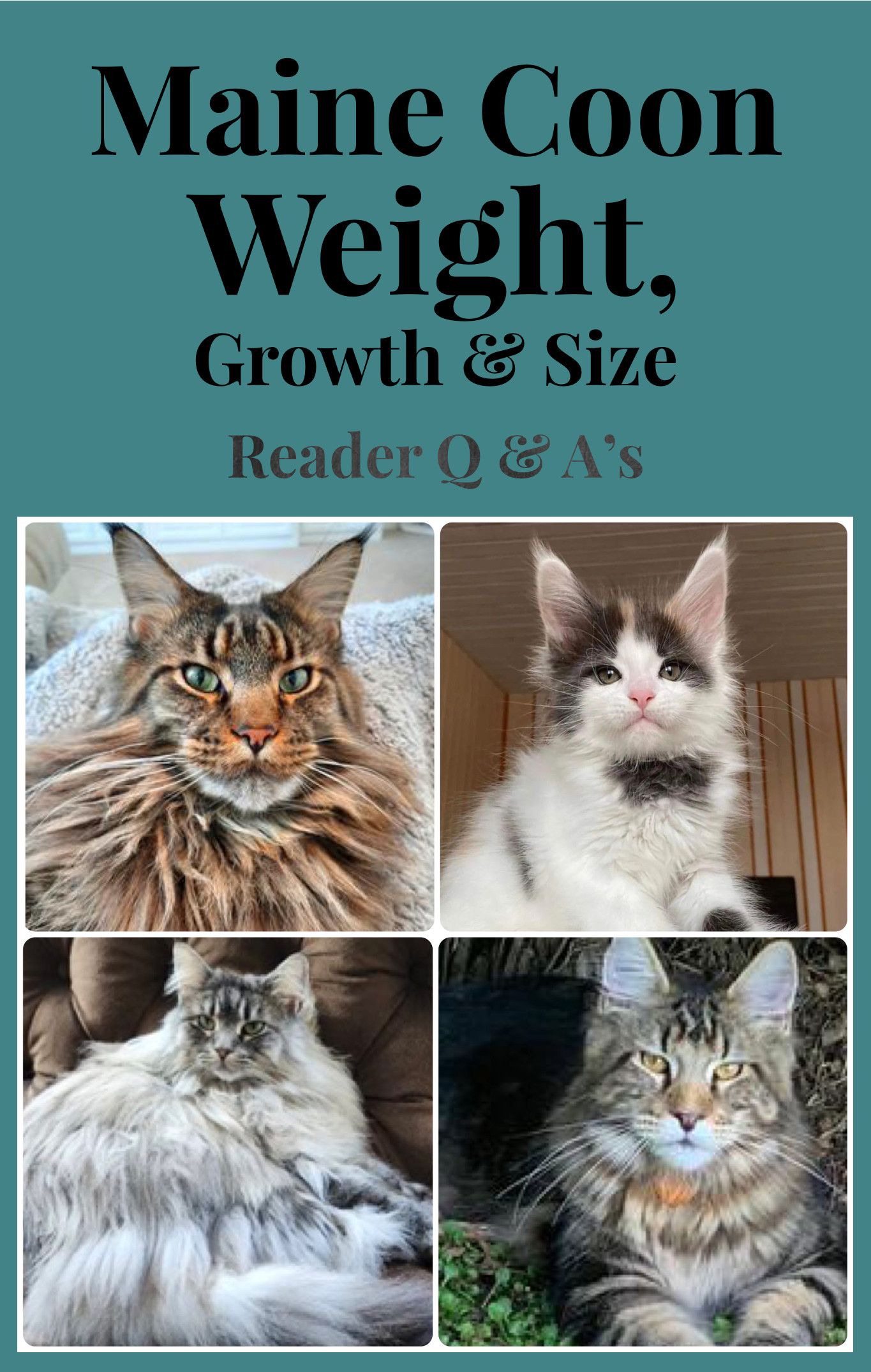 Maine Coon Weight, Growth and Size Questions
Maine Coon Weight, Growth and Size QuestionsThis is the largest domesticated cat breed, so there are many questions regarding their size.
It's an important part of keeping our gentle giants happy and healthy!
Myth: Maine Coons are prone to obesity.
Fact: With proper diet and exercise, they maintain a healthy weight.
Because of their naturally large size, some people mistakenly believe that Maine Coons are prone to obesity.
While they are one of the biggest cat breeds, they are also beautifully proportioned, with a larger bone structure that supports their impressive size.
A healthy Maine Coon, even when big, should have a muscular, solid frame, not excess fat.
Like any cat, they can gain weight if overfed or under-exercised, but they are not inherently prone to obesity.
By providing your Coonie with a balanced diet and plenty of playtime to stay active, you can keep them in excellent shape.
Interactive toys, climbing trees, and puzzle feeders are great ways to engage their playful side and maintain their health.
With proper care, your Maine Coon will stay strong, energetic, and healthy—big and beautiful, but never overweight!
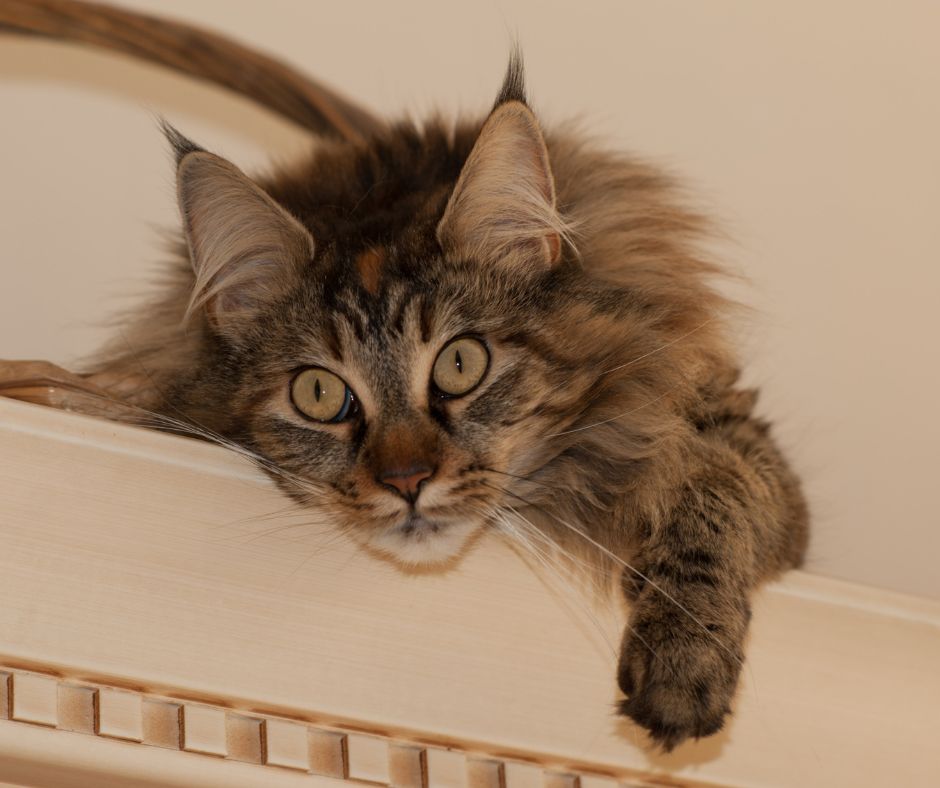
How Much Does an Adult Maine Coon Weigh?
How Much Does an Adult Maine Coon Weigh?
Maine Coon cats are known for their impressive size, earning them a spot among the largest domestic cat breeds.
Male Maine Coons typically weigh between 13 to 18 pounds, though some can tip the scales at 25 pounds or more.
Female Maine Coons, while generally smaller, usually weigh between 8 to 12 pounds.
These large bodies come with a sturdy bone structure and a muscular build, making them one of the most popular cat breeds for those who appreciate a robust feline companion.
The physical characteristics of Maine Coons are quite striking. Their broad chests, strong legs, and bushy tails contribute to their majestic appearance.
One of the reasons these cats can achieve such large sizes is their slow growth rate; they often don't reach full maturity until they are three to five years old.
This gradual growth period allows their bodies to develop a solid frame capable of supporting their considerable weight.
A high-protein diet is essential for maintaining the health and size of Maine Coons.
Protein supports muscle development and overall growth, which is crucial for these cats with their large frames.
Additionally, a healthy diet helps prevent obesity, a common concern for large breeds. It's important to balance protein intake with other nutrients to keep your Coonie in top condition.
Due to their size, they are also prone to certain health issues, particularly those related to their joints.
The hip joint is a common area of concern, as the extra weight can put additional strain on this part of the body.
Ensuring your cat maintains a healthy Maine Coon weight through proper diet and exercise is vital in preventing hip dysplasia and other joint problems.
Their large size is one of their most beloved traits, but it comes with responsibilities for their owners.
Regular veterinary check-ups, a high-protein diet, and attention to their physical needs are all part of caring for these magnificent cats.
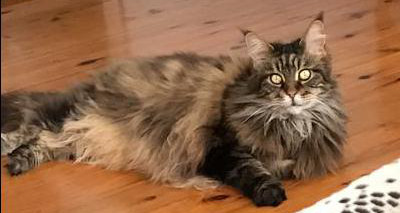
Maine Coon Weight: Kitten Growth
The growth patterns and weight development of kittens is quite interesting!
These awesome felines are known for their impressive size and unique growth characteristics, which make them stand out among other breeds.
Understanding the weight range and growth of a Maine Coon kitten can help you provide the best care and nutrition, setting the stage for a healthy and happy life.
When we talk about the size of a Maine Coon, we're referring to their eventual massive bodies, which are among the largest of domestic cat breeds.
A Maine Coon's weight can vary significantly depending on genetics, diet, and overall health.
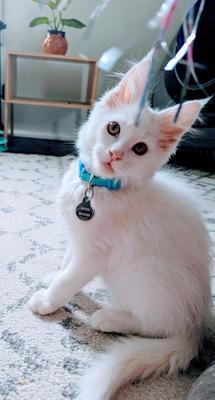
Typically, a Maine Coon kitten will weigh between 1 to 2 pounds at 8 weeks old, and by 16 weeks, they might weigh around 5 to 6 pounds.
As they continue to grow, their weight range can increase dramatically, reaching anywhere from 10 to 25 pounds or more as adults.
One key aspect of a kitten's growth is its relatively slow and steady rate compared to other cats.
While many domestic cats reach their full size within a year, this breed often continues to grow until they are 3 to 5 years old.
This extended growth period allows them to develop their robust frames and muscular bodies.
Monitoring your kitten's weight regularly can help you ensure that they are growing at a healthy pace.
The size of a Maine Coon is also reflected in their skeletal structure. Their hip joints, for example, are designed to support their larger bodies, which is why it's essential to keep their weight in check to prevent any strain on their bones and joints.
Proper nutrition plays a critical role in supporting their growth and overall health. Feeding your Maine Coon kitten high-quality cat food that meets their specific nutritional needs is vital.
The amount of food a kitten requires will vary based on their activity level and growth stage.
It's important to provide them with a balanced diet that includes the right mix of proteins, fats, and carbohydrates.
High-quality food can help promote healthy bone development, maintain a healthy weight, and support their active lifestyle. Avoiding low-quality fillers and ingredients ensures they receive the best nutrition possible.
Free feeding, or leaving food out all day, can be beneficial for some cats, especially since their growth and activity levels might make them need more frequent meals.
However, it’s also important to monitor their intake to prevent overeating and obesity.
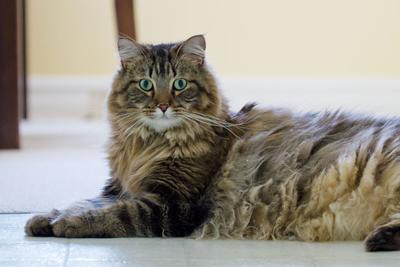
Scheduled feeding can help you keep better track of the amount of food they consume and adjust portions as needed.
Keeping a kitten at a healthy weight also involves regular play and exercise.
Their playful nature and high activity level mean they need plenty of stimulation and opportunities to burn off energy.
Providing toys, climbing structures, and interactive playtime can help them stay fit and engaged.
As they grow into large cats, the Maine Coon breed often surprises new owners with their impressive stature and length.
It's not uncommon for them to earn titles like the "longest cat" in various competitions.
Their massive bodies and majestic appearance are part of what makes them so beloved among cat enthusiasts.
By understanding the unique growth patterns and weight considerations of Maine Coon kittens, you can better support their development into healthy, happy adults.
Focusing on high-quality food, appropriate feeding strategies, and regular exercise will help your Coonie thrive and reach its full potential as one of the most remarkable breeds in the feline world.
Maine Coon Weight Questions and Answers:
Here are our reader questions and answers regarding Maine Coon weight, growth & size:
"How Heavy And Long Should My Kitten Be?"
We bought our 17-week-old silver tabby kitten from a breeder on the southeast coast of the UK.
I'm feeding him four meals a day. He gets plenty of exercise thundering up and down stairs and playing with toys.
He sleeps about six hours during the day. He loves food and is very bold.
One website said a 16-week-old kitten should be fed five times a day! I don't want to overfeed him or risk diabetes.
Alec & Judy Hayman
South East England
Reply:
Hi Alec & Judy,
It sounds like you have a happy and healthy boy. Veterinarians don't have a breed-specific growth chart for Maine Coon kittens like we do for human children.
The full-grown Maine Coon weight range can vary widely, and he could still be perfectly healthy. The key is steady growth from visit to visit.
As for feeding, here's my opinion (not medical advice): Obesity can lead to health issues like diabetes and arthritis, and it can worsen hip dysplasia and other discomforts. A diet too high in carbohydrates is often a major cause of diabetes.
We free-feed our cats, leaving dry food out all the time and giving canned food as a treat and for variety.
Alice was lean and healthy, while Leo was a bit bulky, which is normal for a big male Maine Coon. If he were to become overweight, I'd start measuring their food.
Some new Maine Coon owners prefer to measure food from day one. That’s your choice, but with a busy household, free-feeding made more sense for us.
Refer to the food packaging or your vet’s advice on the amount and frequency to feed him, considering his larger-than-average size for a kitten.
Young kittens are active and burn a lot of calories, so overeating shouldn't be a concern yet. Enjoy your new boy!
Comments:
Free Feeding
by: Tracy
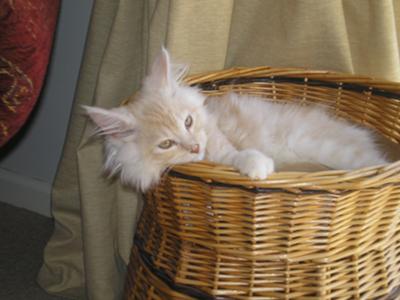 Little Leo
Little LeoI agree with Carrie. We have a 15-week-old kitten, Little Leo, and we allow him to free feed.
Our breeder in Cornwall advised feeding him wet food twice a day and leaving dry food out all the time.
We've continued this pattern, and he is healthy and active.
This is our first Coonie, but we've had moggies before. In my experience, cats generally don't overeat and eat what they need. Hope this helps.
Maine Coonesaurus
I have a 6 and a half month old Maine Coone boy who is currently just over 7kg and 36 inches in length (head to tip of tail). He's massive.
The vet told me he is going to be a big boy and to free feed him.
He is on a good quality kibble 24/7 and is given raw minced chicken mixed with Applaws (tried every food and this works for him and no gut issues).
He doesn't always want his raw meal so it's offered to him regularly throughout the day. He is a contented little guy with no issues.
Vets have advised not get get him neutered until 10 months plus to give his growth plates a good chance to establish unless he presents issues (spraying).
He is growing so rapidly it's ridiculous! Do you agree with my vet?
Nicki from the UK
Replies:
Your growing boy: I totally agree with your vet. Definitely a keeper. I neutered all my boys at approximately 10 to 11 months. All big guys with strong bones.
~Angela
Our growing boys! I agree too! My boy Beast just turned 7 months. He weighs 13 pounds and his tail is just over 14 inches
He is a very long cat around 34 ok inches give or take an inch.
I was told to wait on neutering too. Good luck with him. Keep us posted in his progress!
~Mitzi
How Big Will a Maine Coon Kitten Become?
I was wondering if you can tell how big a Maine Coon will get by their size as a kitten? My kitten is 2.5kg at 15 weeks old. Is this an average weight for a Maine Coon kitten?
Cassie in QLD, Australia
Reply:
Hi Cassie, he sounds like a good-sized boy! That's about 5.5 pounds for our American readers.
At 15 weeks, he's already close to the size of some full-grown regular cats. For a better estimate of his eventual size, your breeder would be the best person to ask.
But he seems like he'll be a big kitty!
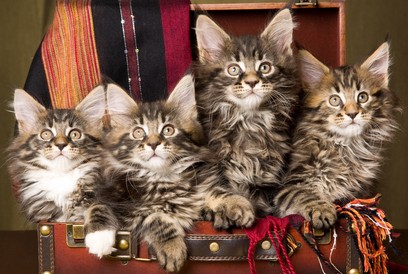
Comments:
yay - same weight!
by: Katie in Jacksonville FL
Cassie, my kitten Rockie is the same age and weight! He's a mix, not a purebred MC, but I'm very proud of my big boy. I'm also curious to see how big he'll get!
Thanks
by: Cassie
That's good to hear! He is growing very fast. I might call my breeder to ask. I posted some pics of him up. Thanks for your comments, this is a great site!
yay!
by: Katie
Cassie, you got me curious, so I weighed Rockie yesterday. When I took him to the vet at the end of July, he was 16 weeks and 5 pounds.
Now, a month later, he weighs 7 pounds! It's cool to have cats like this; they're so different.
Rocky
by: Cassie
I read that they should gain about 2lb/1kg per month, so it sounds like he's growing well!

Boney Maine Coon Weight
We have two male Maine Coon brothers turning one year old this month. One of them is quite bony, even though he eats well (mainly dry Royal Canin with some wet food).
He has a heart murmur but remains playful. Can you recommend any food to help him gain weight? I read about Royal Canin recovery food - would that help?
Kelly in Cornwall
Reply:
It sounds like you're taking great care of your boy, especially with his heart murmur. Did your vet suggest any dietary changes?
Sometimes, a cat's diet needs adjusting if they're not thriving on their current food.
When Alice lost weight and became bony, my vet explained that even the "best" high-protein food can disagree with some cats.
If your boy isn't doing well on his current food, trying a new one might help. Have you checked our page on Royal Canin pet food?
Many cat owners have seen improvements after eliminating corn from their cats' diets.
You might consider switching to a food without corn to see if it helps. While Royal Canin's recovery formula is designed for ill or struggling cats, it may not be the best fit for your situation.
Some recommended brands include:
- Answers
Additionally, my cats thrived on Wysong Epigen, which is grain-free.
Comments:
Proper Nutrition for Maine Coon Weight
Prize Choice frozen pet mince beef and chicken (raw) is close to a natural diet for cats. Introduce it slowly. I feed my Coonies this, and it was recommended by the breeder.
Try to eliminate gluten next...
by: MaineCoonMom
It sounds like your cat might have a gluten intolerance. Many foods contain hidden gluten (wheat, rye, oats, rice, corn, soy, etc.), which can cause digestive issues. Even Royal Canin has gluten.
Look for gluten-free options like Wellness Core, Orijen, and Innova EVO.
Also, Fancy Feast has gluten-free varieties. This approach helped my cats reach a healthy Maine Coon weight and avoid vet visits for IBD flare-ups.
Recognizing the Onset of Feline Obesity
Buddy is 5 months old and due to be neutered soon. I'm concerned about obesity, as indoor cats can be prone to it.
I don't want Buddy to waddle like some of the larger Maine Coons I've seen on YouTube.
None of our previous cats or dogs have been overweight, but having an indoor cat is new for us.
Judy in the UK
Reply:
Obesity in cats is definitely something to avoid. While some people find "fat cats" cute, it's actually quite sad since it leads to a shorter, uncomfortable life.
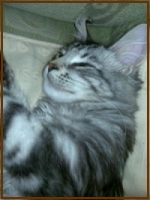
Maine Coons are naturally large cats, and a bit of extra weight in middle age is normal.
For instance, my male Leo had a hanging belly, but Alice stayed lean. They both free feed, and it works for them.
Just keep an eye on Buddy. There's no specific weight for Maine Coons that signals a problem; it depends on their length and build.
Your vet will advise if you need to adjust his food intake. A swaying belly isn't necessarily obesity—it's just a bit of extra weight.
Don't worry too much. You'll be able to tell the difference between a healthy, large Maine Coon and an overweight cat. Cats also tend to lean out in their later years.
Ideal Maine Coon Weight
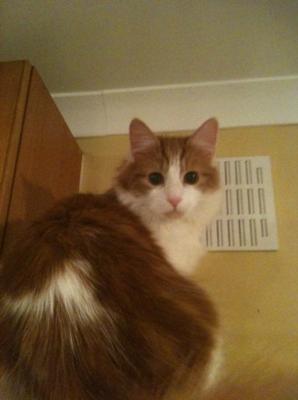 Milo
MiloI have an 18-month-old male Maine Coon-Ragdoll mix, Milo, and my husband keeps saying he's fat.
He has his big winter coat and mane now, so he looks big, but when I feel his body, he seems fine.
How much should he weigh? Should I take him to the vet to make sure he's not overweight?
Denise
Reply:
Hi Denise, as a Maine Coon-Ragdoll mix, Milo could be quite large and still be healthy. Both breeds are big cats, and at 18 months, he might still be growing.
I can't give you an exact number, but an average weight for a male could be around 15-18 pounds.
However, just like people, he could be above or below this range and still be perfectly healthy.
If he feels fine when you check his body, there's likely no need to worry. The first sign of excess fat would be under his belly.
A truly overweight cat can't run well or clean its bottom properly. It's not cute; it's unhealthy.
Milo is probably just a big boy. He could weigh anywhere from 15-25 pounds as an adult, and as long as your vet thinks he's fine during regular check-ups, he's good to go.
To ease your mind, weigh him at home and measure him from head to bum and head to tail.
Call your vet with these details if you're still concerned. Your husband might just not be used to large cats like Milo!
Comments:
Milo's actual weight
by: Denise
Hi Carrie, I took Milo to the vet today for a weight check. He's 6.4kg (19 months old now).
The vet said he's fully grown, but I think he still has some growing to do, considering full Coonies take 4 years to mature.
She wants to see him in 4 weeks for another check. She's advised me to stop giving him wet food and stick to dry food only.
He's been very miserable today, so I'm off to give him lots of cuddles!
Is my kitten too HUGE???
I have a 6-month-old male Maine Coon kitten and a female of the same age from a different litter.
She weighs just over 6 pounds, but he's pushing 11 pounds! I know these cats get very large, but isn't that really big for a kitten?
He doesn't seem overweight (you can feel his ribs), just muscular and solid. Do most Maine Coon kittens grow this fast?
Kim in Orlando, FL
Reply:
Hi Kim,
Not most! It sounds like you have a big boy on your hands. He might grow into one of those magnificent male Maine Coons everyone loves to marvel at!
At six months, he's bigger than most house cats already, which isn't unusual for the boys.
They may look grown up to most people, but they keep putting on weight and growing. I think he's just fine. Enjoy your beautiful cats :)
Comments:
Huge kittens are normal for this large cat breed
by: Toni
Hi!
I adopted a new "kitten" from the shelter a week and a half ago as a playmate for my 18-month-old cat who was lonely.
I didn't realize he was a kitten until he nibbled on my fingers with baby teeth!
At his vet visit last week, he weighed 10.17 pounds, and my vet estimates he's 5-6 months old.
She calls him a "big boy," just like Carrie mentioned. She also bets his weight will end up being in the 18-20 pound range when fully grown.
He looks like a full-grown cat and isn't fat at all. He's a bit skinny and eats constantly.
I'd say your kitten is perfectly normal for his breed. Coonies keep growing until around 3 years old.
Just be sure to provide him with high-quality food for those growing bones. 😊
Is My Kitten Underweight?
I've had my female Maine Coon mix for about six months. I wormed her, gave her hairball treatment, and she’s eating more, but I can still feel her spine and rump bones.
She only weighs 2 kilos and is around 15 months old. She was sold to me as an American House Cat, but my vet says she’s likely 90% Maine Coon.
I'm really worried about her weight, but my vet didn't seem concerned. Any advice?
Tricia in the UK
Reply:
Hi Tricia,
At 15 months, 2 kilos (4.5 pounds) is quite light. However, since your vet isn't concerned, you might consider a second opinion for peace of mind.
Being a mix, her size can vary. The "90%" is just an estimate; she might have one purebred parent, making her around 50% Maine Coon. My purebred female only weighs 8 pounds (a little over 3.5 kilos) fully grown.
This breed is slow to mature, reaching full size at 3-5 years, so she has time to grow. I hope this helps!
Comments:
Maine Coon Weight problem
by: Helen
Get your vet to draw blood and do a full CBC with differential, plus a full chemistry and electrolyte panel to rule out possible causes.
If your vet refuses, seek another opinion. A young cat's spine and hip bones shouldn’t be easily felt. Your concerns shouldn’t be brushed off.
Maine Coon Weight
by: KT
I have a mix I found at a shelter. At 2 months, he weighed 2 pounds. By the end of July, he was 5 pounds at 4-5 months old.
My other mix, Bella, is 2-3 years old and weighs 11.5 pounds. I hope this helps as a reference.
You might want to consult another vet, as several people here agree this isn't normal.
Overweight Cat
I just took my 4-year-old male Maine Coon to the vet, and they said he's grossly overweight at 10.25 kg. Is this correct?
They want to put him on a balanced diet. He gets 2 teaspoons of tuna a day plus a bowl of dried food, which he doesn't always finish.
Mal in Stockto
Reply:
10.25 kg (about 22.5 pounds) is a typical weight for a male Maine Coon. Is your vet familiar with this breed? Here are some factors to consider:
- Length: If he's under 3 feet (0.91 meters) from head to tail, 22.5 pounds might mean he carries extra weight in his belly. Our Leo was that length, weighed 20 pounds, and was a bit porky in the middle.
- Purebred or Mix: Purebred Maine Coons are big-boned. If he's a mix, his weight might be more like a domestic house cat.
When your vet examined him, they felt for fat around his middle.
If he's pedigreed with the length and bone structure to support extra mass, and doesn't have much belly fat, limiting his diet severely might not be necessary. A purebred Coonie may never be a 4-6 kg cat.
It sounds like he doesn't overeat. Instead of tuna, try canned cat food once or twice a day.
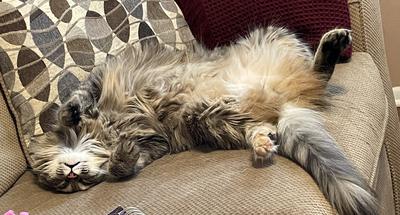
It's less calorie-dense than dry food and has high moisture content, allowing him to eat the same amount but consume fewer calories. Weight management food might help too.
PS: Tuna, although loved by cats, is unhealthy for them daily. It contains purine, which cats can't digest, and mercury, which can be toxic.
Tuna is also linked to a painful intestinal disease called Steatitis. It's best as an occasional treat.
12 Week Old Maine Coon Weight and Size
My 12-week-old kitten, Pippin, looks a lot like my short-haired tabby.
I was told she's purebred, but I'm worried her previous owner may have lied.
She has no lynx tips, no tufted toes, barely an 'M' on her forehead, no puffy tail, and her feet are average-sized.
Will she grow into a big tail, longer hair, and bigger feet? If so, when?
Elaina in New Hampshire
Reply:
Hi Elaina,
Congratulations on your new kitten! I bet she is a delight!
It's possible her previous owner misunderstood what a purebred Maine Coon is.
For her to be a true Maine Coon, both parents would need to be pedigreed. If not, the label might be misleading.
At 12 weeks, she will definitely grow and put on weight. However, without a pedigree, it's hard to know if she'll develop the classic Maine Coon traits like big feet, a bushy tail, and large size.
Purebred kittens usually already have distinctive features like big ears with tufts and some shagginess by this age.
You can browse our site, especially the kitten section, to see photos and examples of typical Maine Coon kittens.
Enjoy your time with Pippin!
Buddy's Head Size
Buddy is now 15 months old, but his head size hasn't increased much.
At his veterinary check-up yesterday, the vet commented on the small size of his head.
Carrie, do you or anyone else have any info? I'm hoping that with age, Buddy's head will grow. What is the size of your cats' heads?
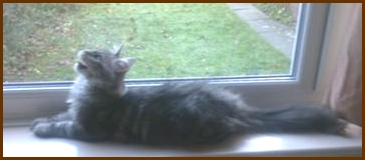 Buddy
BuddyIf you don't mind sharing, it'll give me something to compare or look forward to. Other contributors, please chime in too.
His breeder mentioned having trouble with his litter and resuscitating one. Could that be related?
Good work Carrie and family! Your website is brilliant and has something for everyone.
Judy in the UK
Reply:
Hi Judy,
I've never wondered about head circumference before! To measure it, use a cloth tape measure, wrapped around the cat’s head just behind the ears and across the forehead.
Here are the measurements I found:
Alice: 10 inches / 25.4 cm (she's small even for a female Maine Coon) Leo: 12.25 inches / 31.12 cm
Keep in mind, this is highly inexact! They didn't like it, wiggled their heads, and I’m not sure if I placed the measuring tape exactly right.
I hope this helps! I do hope more cat lovers will share their measurements too...
Thanks for your kind words! I love this site and I'm honored to be part of this awesome community :)
All the best to you and Buddy
Comments:
Small Head
by: Helen
Judy, you didn't mention if Buddy is neutered. Males neutered before puberty have smaller, more feminine heads because hormones are removed before secondary male characteristics develop.
After 6 months, males develop big cheek pads, giving them a more masculine look and bigger heads.
If Buddy isn't showing neurological difficulties, I wouldn't worry about his head size.
Buddy's Head Size
by: Judy UK
Buddy was neutered at 5 months due to dominant behavior. I'm also grateful to Carrie for measuring her cats.
I'll try measuring Buddy's head with a cloth like a bonnet and see if there's any difference. It should be fun since Buddy has a great sense of humor when he knows I'm serious.
Finally, I'll call his breeder and ask about his parents and his mum, Moonstar.
Our Newly Adopted Kitty Won't Eat
Hi, We adopted our kitty 1 week ago. They told us she is 6 months old, but she is very tiny for that age. Because of her amount of hair, she appears bigger than she is.
We assume she was a stray and separated from another cat because she loves sleeping in very small places and against something or someone. Our issues are:
- She will not eat or drink the amount she should. Due to her small size, this has me worried. She is eating and drinking but not as much as I think she should.
- Litter box training her. She likes to crawl behind the fridge to do her business. I realize this will take time.
She is a very friendly and loving kitty. Any advice would be greatly appreciated!!
Megan in St. Petersburg, FL
Reply:
Congratulations on your new girl! I'm sure she'll bring you years of joy!
For her eating, if she’s small but eating, she's likely getting what she needs.
Since she's vet-checked and eating for you, try leaving plenty of kibble out, change her water frequently, and offer canned food daily. If she eats even a bit, she's getting enough.
For litter box training, you're right, it takes time, but stay on top of it. Bad habits are hard to break.
Block off the fridge and place a litter box nearby. Once she uses it, gradually move it to another room. Be patient; it may take a while!
Comments:
Eat fresh!
by: Helena-Sophia
Cats love fresh food! In the wild, they get fluids from their diet. Try raw fish, ground turkey, chicken, or beef mixed with water, nutritional yeast, and pulverized egg shells to boost her health.
Feed her "Blue Buffalo" cat food. It's the best and not much more expensive than other brands.
For the litter box, use pine pellets. They’re environmentally friendly, cheaper, and great at controlling odor.
Check your local farm and feed store for "Horse Bedding" like the "Pinnacle" brand.
All the best for you and your beloved feline!
Top of Maine Coon Weight Q & A's
« Back to Maine Coon Health
Do you have a question about Maine Coon Cat weight, growth or size? If your question wasn't answered on this page, ask here:
Do You Have a Related Cat Question? Ask Us Here!
Do you have a question? Fill out the form below to get an answer! Give us as much information as you can, so we can best understand your unique cat questions!
Recent Articles
-
Today's Features
Apr 16, 25 09:54 PM
Today we have two classic Memory Lane pages to share!
Murphy & Candy Cane: Double the Maine Coon Charm - This adorable Maine Coon duo from our 2011 Photo Albums - Murphy and Candy Cane - brought doubl… -
Memory Lane Month Begins!
Apr 15, 25 10:22 PM
We're thrilled to start our "Memory Lane Month" event by visiting some cherished moments from our community! We're in the process of restoring meaningful community stories like this one, to preserve t… -
Will a Maine Coon Protect Its Owner From Danger or an Intruder?
Apr 09, 25 10:41 PM
Plenty of people are curious: Will a Maine Coon protect its owner if something happens? Let’s talk about what this means, and what kind of protector a Coonie is.
